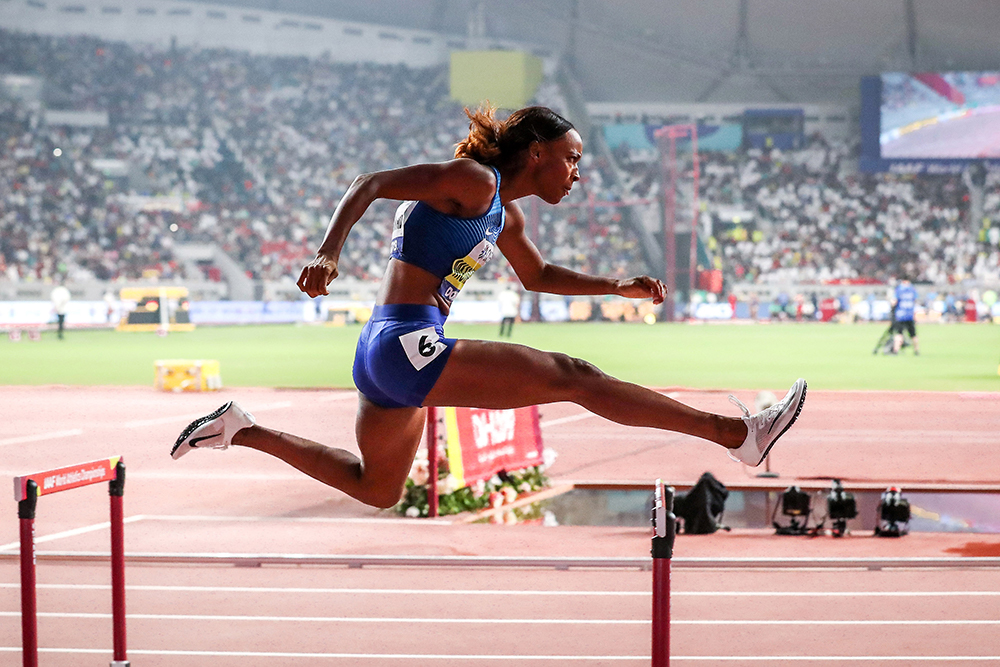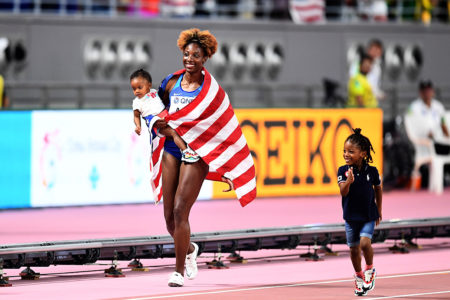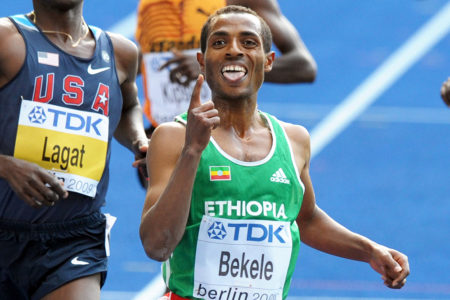
THIS SEASON’S feats by Dalilah Muhammad, WR-setting 400 hurdles winner in Doha, have been awe inspiring. As have the performances of her rival, Sydney McLaughlin, for that matter. The younger hurdler ran under the World Record as of season’s start and lost only in WR races. Twice. Those WRs, though, both sprung from Muhammad’s virtually untiring legs, and it is Muhammad who will now carry favorite’s status into the Olympic season, Muhammad who on the basis of those records, her Rio gold race, and now a Worlds gold added to her two silvers has hurdled herself into the pantheon of all-time royalty in her event. All after the 29-year-old New York native paused some time ago to ask herself a question:
“’Why not me?!’ You know? Someone’s gonna do it so why can’t it be you? And that’s kind of what I’ve been going with ever since.”
Muhammad says the query came to her as “an epiphany one day” during her preparation for the Rio Olympic campaign of ’16. “I’d had two bad years and I was trying to find a way to come out of that and what I had to do, and I changed a lot of things that year [including beginning her collaboration with coach Lawrence Johnson] and that’s kind of when it came to me: ‘Someone’s gonna win the 2016 Olympics, you fought really hard in ’13, so let’s go for it.’”
To be sure, Muhammad—since finishing up at USC in ’12 with a 5th-place NCAA finish—had come close to meeting her own elevated expectations. She won the U.S. title in ’13 with a barrier-busting 53.83 clocking and then placed 2nd at the Worlds in Moscow, timed in 54.09 as Czech Zuzana Hejnová ran away with the crown. Muhammad didn’t manage, though, to carry that momentum into ’14 and ’15.
With her win in Rio, however, she convinced herself. “It’s definitely been a journey and I’ve enjoyed every step of the way,” she admitted in Doha, delighted to have, along with McLaughlin, produced the brightest highlight so far in a Worlds of competition more incandescently hot than the prevailing weather outside the air-conditioned stadium. “I’ve learned so much every year. I’m still learning, I’m still growing as an athlete. I’m definitely happy to have those downfalls ‘cause they make these highs so much better.”
This World Record high, 52.16, was realized because Muhammad never shifted her gaze from the prize. Not even after she stunned onlookers and herself with that first WR, the 52.20 in Des Moines. “You know what?,” she asked standing on one side of Khalifa’s press conference stage facing a covey of reporters. “I actually have not watched that race that much, and the reason for that is because I didn’t want to relive that moment and have that be the highlight of my career. I was so happy for that but ultimately the World Championship title was the goal this year and that’s what I wanted more than anything.”
Muhammad, recognizing that holding her Des Moines peak for 2-plus months until Worlds would be a bridge too far, “took a week off and kind of just settled back down,” she said. “We kind of went back up and trained in doing our base kind of training again, just staying fit but not trying to get any faster than what we already were.”
Then events at the DL Final in Zürich heightened anticipation when McLaughlin evened their seasonal score with a 52.85 win; Muhammad took 3rd with Doha non-qualifier Shamier Little in between them.
The Worlds final would be a duel. “For me,” said Rushell Clayton the Jamaican who claimed 3rd on the night, “I knew it was going to be a fast race because these ladies have been running fast all year, and I haven’t quite got to 52 yet so all I did was maintain my composure and run for a bronze medal.”
Often when Muhammad takes the blocks to compete, technique and race model details occupy her mind. “It’s stride pattern,” she said. ‘This race I just tried to blank it out. I think we get too in our heads and try to be perfect and do everything. Sometimes you have to just trust in what you’ve been doing all year, trust in your training. So this day I really wasn’t thinking about anything and [was] just going for it.”
Beyond that Muhammad had to consider that McLaughlin in lane 4 would have line of sight on her lane 6 position, at least in the early going. “I definitely think when you’re so focused and at the same level of talent that lane assignment definitely starts to play a role and every little advantage matters,” she acknowledged afterwards. “I just try to remember that when I’m in training, I’m always in the lead with my training partner. Any time we do any type of training interval I always lead, and I just had to go with that in this race and just hold on to what I do every single day at practice.”
Expectations for a fast time were soaring like the Doha heat and humidity given the principals and circumstance, but as McLaughlin observed, “I don’t know if everyone was expecting another World Record.” The star duo, both of them, merely ran to win. “I just think the race was pretty fast from the start,” Muhammad said. “Sometimes you’re trying to tell yourself to back up a little bit, that you’re going too fast, but in this race I just think there was no holding back to actually be done. So I definitely did know I was moving pretty fast, and probably about the last 100 you just tend to zone out. At that point you just want to hold on.”
To the suggestion her latest global standard may last only 10 months, until the Tokyo final, Muhammad replied, “Maybe less than 10 months.”
The two-time recordsetter believes she has more to give against the clock. “ I definitely think I can improve on the finish,” she said. “I think I can find a better balance with taking it out and having a better finish. Maybe taking it out a little slower to have a better finish or, yeah. I think I’ll try to push in 2020 [for] 15 steps all the way around. I’m kind of doing 16 coming home. Why not? I’ll try to go 15 all the way.”
There’s that question again: Why not?






